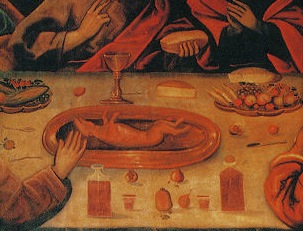Recently I posted a quick book review by my friend Rabbi Eli Cohen. Eli works hard running Jews for Judaism in Australia, where Jews for Jesus also works hard trying to catch Jewish souls. Over the last ten years Eli and I have had many discussions about organizations such as Jews for Jesus, Messianic Jews, and the like.
Eli asked if I could post this review on TravelingRabbi.com, though first I’d like to share an experience I had in New Zealand regarding this “Kosher Jesus” matter.
On my first trip to New Zealand in 2001 I ran into some Israelis who were going to stay at a family’s home who were part of H.I.T., which stands for “Hosting Israeli Travelers.” After paying a $35 membership fee (at the time) you’d get a booklet with around 300+ families who open their homes to Israeli travelers. I called to find out if I could join, saying, “I’m not Israeli though I’m a young Jewish Rabbi.” I was granted membership and then spent a few nights with families from the Hosting Israeli Travelers program.
It became obvious to me that it was run by a Christian (probably Baptist) organization trying to convert Jews to programs like ‘Jews for Jesus,’ or ‘Messianic Jews.’ The families I stayed with were very nice, warm, and welcoming and I had a good time, but there was that undertone of ‘I want to convert you.’
Some of the Israelis I spoke with were fully aware of what the program was trying to achieve but they did not care. They were strong in their beliefs and said, “we’re just using H.I.T. for the free accommodation.” However, some Israelis (may G-d protect us), do get caught up in their organization.
I remember how in one home that was part of Hosting Israeli Travelers, I took note of the screen saver on the computer. It flashed pictures as follows: the Western Wall, a menorah, Jesus on a cross, and then an Israeli flag. There was also the general overtone of items around the house like Jewish books mixed with Jews for Jesus books. Menorahs and crucifixes and a map of Israel on the wall alongside a picture of Bethlehem.
How successful are they in convincing Jewish Israelis that Jesus could be kosher?
It’s hard to say, but unfortunately they do have some success as I know personally one Israeli boy who caught up in the whole thing.
I’ve written this post to create some awareness of the matter.
And now here is Rabbi Eli’s book review on Kosher Jesus:
“Kosher Jesus” – A Book Review
In his new, highly controversial book, Kosher Jesus, Shmuley Boteach sets the stage by describing the strong overtures of Christian love towards Israel and the Jewish people. Boteach views this development as a positive step in the Jewish – Christian relationship; however, Boteach points out, there is still a sticking point between Jews and Christians, and that is Jesus. [1]
Boteach’s book presents a solution [2] that he believes will allow both Jews and Christians to overcome the barrier that stands between them. [3] Boteach proposes that instead of Jesus being the issue that divides us[4], we should allow him to serve as a bridge that unites us in the common interest of promoting Judeo – Christian values.[5]
Setting the bar in his introduction, Boteach boldly claims to know the “authentic story” of Jesus of Nazareth[6]. Virtually all historians and scholars agree that when trying to reconstruct the life of the “Historical Jesus” one is crippled by the lack of surviving evidence outside of the Gospels (records which Boteach himself disqualifies.)[7] This leads the reader to wonder how Boteach is going to make his case convincing.
Basing himself on the works of Hyam Maccoby, Boteach insists that although the Gospels cannot be accepted as authentic or reliable, they have nevertheless retained traces of a Jewish Jesus who did not teach against the observance of the Torah[8] and who never claimed to be God. Boteach sees Jesus as a patriot who fought against the occupying Romans; a struggle which cost him his life.
Boteach recognizes that Maccoby’s works alone – which argue that the real Jewish Jesus was radically different than the “Christian” Jesus – have not convinced Jews (or Christians, for that matter) to re-evaluate their deeply ingrained vision of Jesus. Boteach is intent on presenting a more persuasive case with “historical underpinnings”.
In order to vindicate his view of Jesus, Boteach questions the reliability of the Jewish and Christian sources about Jesus, asserting that the truth has been obscured on both sides. In this book, he puts forth the fruit of his “twenty years of in-depth study of Christianity and the New Testament”.[9]
According to Boteach, Jesus is actually an impressive scholar and a visionary[10] who never claimed to be divine. He is someone with whom the rabbis “have no problem whatsoever”.[11] [12] Boteach’s Jesus rebels against the Romans and is crucified by the Romans. End of story. Boteach hopes that by presenting Jesus as a Jewish freedom-fighter and sage, Jews will now embrace the impressive scholar and visionary he sees in Jesus.[13]
Boteach urges his Christian readers to focus on the humanity of Jesus.[14] In Boteach’s view, Christians, who are staunch supporters of Israel and the Jewish people should be able to get past the Jewish rejection of the “Christian Jesus” and expand their view of Jesus to include a Jewish Jesus, who fought for his country and was killed by the Romans.
Boteach’s retelling of the Church’s infancy offers little new information except for his views about Peter[15] who he claims is the author of an anti-Semitic document.[16] The resurrection claims of Jesus’ early followers are conspicuously missing in “Kosher Jesus”[17], an omission that would raise the eyebrows of his Christian readers.[18]
When turning to Paul, Boteach emphasizes that Paul distorted what the real Jesus stood for.[19] In a chapter entitled “Paul the Convert”, Boteach asserts that Paul’s claim of being a Pharisee is highly suspect. “The belief that Paul was a convert to Judaism dates back to the time immediately following Jesus’ death. The Ebionites, the remnants of the Jerusalem Church under the leadership of James (whom the New Testament and Josephus say was Jesus’ own brother), insisted that Paul was a non-Jew who had converted to Judaism”.[20] In reality, however, this is a theory that Maccoby himself (Boteach’s only source for this) admits is not a historical fact but rather something based on a single questionable fourth-century document.[21]
Boteach is understandably upset with Paul for distorting the message of Jesus. But in his zeal to discredit Paul he shoots himself in the foot.[22] Boteach mistakenly combines two of Paul’s teachings[23] in order to accuse Paul of misquoting and giving fraudulent meaning to a verse from Deuteronomy 21:23. [24]
Boteach also exposes the Gospel writers for their ineptitude in stitching together the data.[25] For example, he calls out the Gospel of John for being inconsistent with the synoptic Gospels by placing Jesus’ crucifixion on the second day of Passover instead of the first. Boteach found this mistake ironic since in temple times there was only one day on which the Pesach sacrifice was offered and eaten.[26]
Unfortunately, Boteach will find himself guilty on the same charge he brings against the author of the Gospel of John. In John, Jesus is not crucified on the second day of Passover; he is reportedly crucified on the day before Passover, at the precise time that the Paschal Lamb would have been brought to the Temple in accordance with Jewish Law. [27]
In trying to help his readers understand why Jews must reject Christian doctrines such as: original sin, the virgin birth, the messiahship of Jesus and the deity of the messiah, Boteach refutes these doctrines, appealing to logic as well as the Jewish scriptures.[28] He apologizes to Christians for doing so[29] making it clear to his audience that he has no problem with Christians believing these things[30], but for Jews he says, these doctrines are not acceptable.[31]
Bible-believing Christians may view this as hypocrisy, since Boteach’s assurance is that “Jews want Christians to observe Christianity”.[32] But then in a fiery response to his Jewish critics, he writes that he is trying to spread the Noachide covenant as per the wishes of the Lubavitcher Rebbe. [33] Surely Boteach is aware that according to the view of Maimonides[34] and the Lubavitcher Rebbe[35], a Christianity that worships a man as God (a practice Boteach strongly rejects[36]), has no place in the Noachide covenant.
At the same time, Jews will also have problems with Boteach’s propositions.[37] Judaism will never view Jesus as a prophet[38] and a holy man.[39] Does Boteach honestly expect the Jewish community to re-examine and learn the teachings of Jesus? [40] This suggestion contravenes rabbinic enactments against the study of non-Jewish sacred texts including the Christian Scriptures.[41] [42] Jews have never been, nor will they ever be quick to buy into anything that is associated with Jesus or with the Christian Scriptures. Since Boteach acknowledges that the teachings of the Christian Scriptures in their current form are unacceptable, his proposal to Jews is all the more perplexing.
In summation, despite Boteach’s good intentions, this book is a poor stab at presenting a scholarly view on Jesus. Boteach’s recommendations are an affront to Jews and Christians and will only appeal to those who are uninformed in matters of religion and history.
This review was prepared by Rabbi Eli Cohen of Jews for Judaism Australia.
Read More









